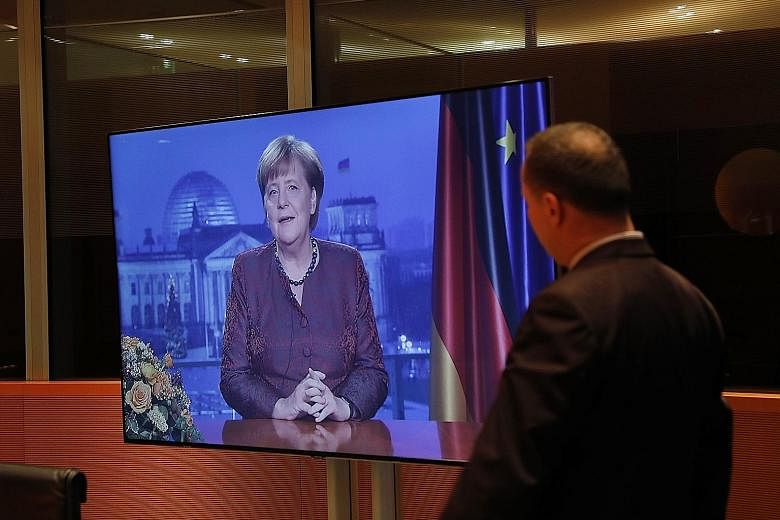BERLIN • Chancellor Angela Merkel's conservatives and the Social Democrats traded barbs about migration and tax cuts yesterday amid mounting questions about whether they can agree to renew the "grand coalition" that ruled Germany for the past four years.
Dr Merkel, under pressure after failing to form a government three months after national elections, hopes to secure a fourth term in office by persuading the centre-left Social Democratic Party (SPD) to join the government despite punishing losses in last September's election.
Party leaders will meet for preliminary talks today ahead of exploratory talks scheduled for Sunday to Jan 12, but a growing number of politicians now say Dr Merkel might have to rule with a minority government, or face new elections.
SPD deputy leader Thorsten Schaefer-Guembel said recent comments by some conservatives were "counterproductive for every form of government formation", adding that they had sparked doubts about the will of conservatives to govern together. He said a deal on a new coalition was far from certain and it was unclear if the talks could develop sufficient trust.
"A minority government remains an option, even if Chancellor Angela Merkel doesn't want to acknowledge that," he said in an interview published yesterday in the Passauer Neue Presse newspaper.
He cited differences with conservatives on a range of issues and rejected as "absurd" proposals by some conservatives to cut taxes for high-income earners. Conservatives and the SPD are also at odds over healthcare, immigration, Europe, work regulations and pensions.
Mr Schaefer-Guembel said he backed calls by SPD parliamentary leader Andrea Nahles to raise taxes for the wealthiest, and urged fresh efforts to prevent big companies from evading taxes.
Dr Merkel's Bavarian sister party, the Christian Social Union (CSU), has distanced itself from the SPD through policy papers calling for corporate tax cuts, reductions in benefits for asylum seekers, higher military spending and limits on immigration.
The economic council of Dr Merkel's Christian Democrats said it will urge CSU party leaders to push for a minority government when they meet this week, arguing that Germany would face "enormous financial burdens for generations" if the SPD pushed through its spending plans in a coalition.
The SPD initially wanted to stay in opposition, but agreed to explore the possibility of governing with the conservatives in the interest of political stability after Dr Merkel's coalition talks with two smaller parties collapsed last November.
Experts say new elections could hand more gains to the far-right Alternative for Germany party that entered Parliament for the first time last September. Dr Merkel said a new coalition would be more stable than a minority government.
REUTERS

